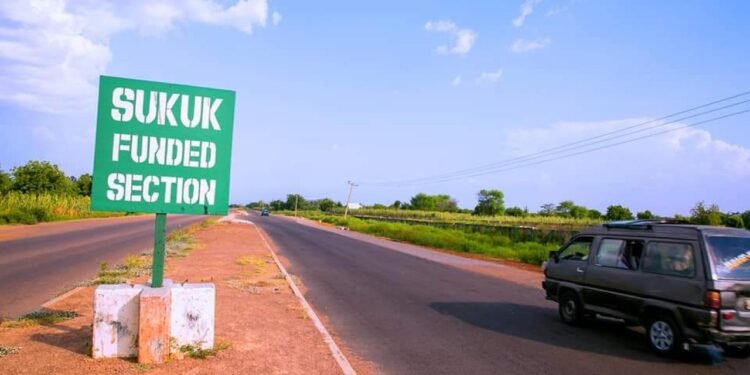By Abraham Olatokunbo
Minister of Works and Housing, Babatunde Fashola has claimed that borrowing to build infrastructure across the country has massively impacted every Nigerian and has added to the nation’s growing economy.
Speaking in Abuja on Thursday at the symbolic presentation of N250 billion Sukuk fund to Ministries of Work and Housing, FCT, and Niger-Delta Affairs by the Ministry of Finance, Budget and National Planning in conjunction with the Debt Management Office, Fashola said wealth is distributed across the country when it is committed to infrastructure.
He said there has been ranging argument in the country on the need to stop borrowing, which he admitted was quite understandable, insisting that that there are many available options if the nation decides not to borrow.
He said: “one option is to say don’t build all of these roads and I say to people tell us the roads in your state you say you do not want to be built and the debt will reduce by the cost of that road. But another thing is to recognize that debt properly used can galvanize an economy and it is that debt instrument that bring so many people from diverse parts of the country today, lawyers are here, fund managers are here, everybody is going to cut a cheque and take home, everybody is going to benefit from the policy of borrowing.
“This is how wealth is distributed across the country when it is committed to infrastructure.
“The other point to make very quickly, I had a conversation with a colleague and he said to me only a few ministries are working in this government and he said well I can see infrastructure and I said when you see infrastructure that is the end result of a lot of people in the background you cannot see.
“Without Debt Management Office, without the Budget, without the Ministry of Finance, the Ministry of Works cannot do one kilometre of road and without legislative support it would also not happen, so it is still Works but what you see in the final analysis is not the staff in the Ministry of Works but it is the input of everybody’s contribution, including the investors who are here, and this is how to really build a nation. Anytime you pass through one of the Sukuk road, say a prayer for Debt Management Office, say a prayer for Ministry of Finance and say a prayer for the legislators, too.
“In government, no one can do anything on its own alone. In conclusion let me just highlight some of the results of Sukuk for the record. The first Sukuk of N100 billion was deployed to 25 roads and it delivered a total of 482 kilometers, the second Sukuk in 2018 was deployed to 28 roads and it delivered a total of 683 kilometers and the third Sukuk that was issued in 2020 for N162 billion was deployed to 44 roads and it delivered a total of 757 kilometers.”
He added that: “Many of the roads have been awarded before we came and it was not funded. And each year Sukuk commits to milestone kilometers you must deliver with this money and the managers with the consultants and our people go to sites to monitor and verify before payment is made.
“But another impact of it is that it has help to create a consistent employment and engagement for 97 construction and contracting companies who are keeping people at work, who are demanding supply of diesel, bitumen, asphalt, concrete and that is how the money is moving round the economy.
“Of course in the end, some result are now beginning to fortify the seeds that we sow about four years ago with the first Sukuk are now fruity.”
He noted that with the Sukuk funding many kilometers of roads have been delivered to the country.
The Minister of Finance, Budget and National Planning, Zainab Ahmed said three ministries will be sharing the N250 billion Sovereign Sukuk issue proceeds to implement selected projects in their ministries.
The Ministry of Works and Housing gets the lion share of N210.6 billion, the FCT has N29 billion with Niger Delta Affairs taken N10.4 billion.
She noted that so far since the initiative in 2017, a total of N362.557 billion has been realized through Sovereign Sukuk for the funding of key road projects.
Ahmed said: “In view of the significant milestones recorded in the USA of Sukuk funds to reconstruct and rehabilitate our road infrastructure, which evidence is visible for all to see, the Government decides to incorporate other Ministries with critical road projects into the Sukuk funding structure. Today, we have the Federal Capital Territory Administration (FCTA) and Ministry of Niger Delta Affairs (MNDA) joining us.”
She noted that the 2021 N250 billion will be released as part of the capital expenditure in the 2021 Appropriation Act, which has been extended by the National Assembly to March 31, 2022.
She said: “As at November 2021, N3.4 trillion has been expended for capital, which represents over 74% performance when compared to the total capital budget of N4.569 trillion. Out of the N3.4 trillion so released, N2.98 trillion represents 83% of the provision for MDAs’ capital, N368.9 billion for Multi-lateral/Bilateral project-ties loans, and N49.52 billion as GOEs capital expenditure.”
She assured that government will continue to prioritize spending on critical infrastructure in order to sustain the momentum of GDP growth.
The Director-General of the Debt Management Office, Patience Oniha, said since the debut N100 billion Sovereign Sukuk in September 2017, the DMO has issued three more, getting better each time and bringing the total amount raised through Sukuk so far to N612.557 billion, insisting that the introduction of Sukuk as a source of raising funds for government has improved road infrastructure across the six geopolitical zones.
Also speaking at the occasion, both Minister of Niger Delta Affairs, Senator Godswill Akpabio and Minister of the Federal Capital Territory Administration, Mohammed Bello said they were grateful for the fund, but since it was way below what they requested, they would soon be coming for another funding.










